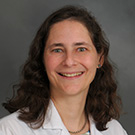Adolescent Medicine doctors are trained to address the very specific physical, emotional and developmental needs of individuals ages 12 to 26. Stony Brook Children’s Hospital is the only hospital in Suffolk County to offer the adolescent medicine specialty. Division Chief Allison Eliscu, MD, Assistant Professor of Pediatrics at Stony Brook University School of Medicine, talks about what the department offers, how it benefits teens and parents, and the role she and her colleagues play in keeping Suffolk County’s adolescents safe and healthy.
What do adolescent medicine specialists do?
First, we cover the full gamut of primary care, the same way a pediatrician or internal medicine specialist does. This includes routine vaccinations, college and sports forms, well-teen visits, treatment of common illnesses and injuries, and management of teens with chronic illness (which we do in conjunction with other Stony Brook Children’s specialists).
Second, we do a lot of subspecialty work that covers gynecological care, birth control, eating disorders, STD testing, evaluation and treatment of depression and anxiety, and management of patients with HIV. We work with transgender patients (along with an endocrinologist and other specialists, if needed) and more. We are attuned to the issues that tend to arise during adolescence, and to the way ordinary illnesses manifest in teens.
When do you typically start seeing an adolescent?
High school seems to be the time when most patients switch to using our services. Typically they are referred to us by their pediatrician for evaluation on an issue that he or she may not feel comfortable treating (or have the specific expertise to treat). We can provide a consult to that physician and either treat the patient or help with referrals to ensure that the patient gets the right type of care by the right specialists . Some pediatricians only treat children up until age 18, so we are a natural transition for teens between pediatric and adult care.
What is an adolescent medicine specialist’s approach to care?
In a word, time.
We spend lots of time with our patients and build long-lasting relationships. We typically spend more time than a pediatrician might, so we are able to address the multiple issues teens face comprehensively. During visits, we meet with the teen and parent together, then each teen separately. And confidentiality is key. The first thing I tell a teen is that our conversation is confidential. Building trust with our patients is one of our core values. However, when cases arise in which we need to notify parents of a medical issue, we let the teen know we will be speaking with a parent.
The time we take with patients is key in keeping teens healthy and safe. The three top causes of teen deaths in the U.S. are accidents, suicides and homicides. We are able to ask questions about the factors which can lead to them, including bullying, substance abuse, mental health, behaviors such as cutting, issues at home, physical abuse and so on.
We have the capacity to manage multiple issues so the patient doesn’t need to see several different doctors for gynecological care, depression/anxiety/ADHD medication and primary care. We can handle all of that within the same visit, which greatly simplifies care. This creates continuity of care that can help keep things from “falling through the cracks” as well as a more “whole patient” approach.
Is it normal? The most common questions to doctors.
For both parents and teens, the number-one question is “Is this normal?” Parents often have questions about behavioral issues as teens push for more independence. Girls tend to ask about their periods — what’s typical, what to be worried about, why they are irregular. Boys — many of whom choose to see our male adolescent medicine specialist, Dr. Zachary Jacobs — also wonder if this bump is normal and is that emotion OK. And because we are so specialized in adolescent medicine, we know what is normal and what’s not. This can be reassuring. But more important, it results in the most appropriate specialized care for teens.
OFFICE LOCATIONS
• 600 Main Street, Suite A, Center Moriches
• 4 Technology Drive, East Setauket
• 269 East Main Street, East Islip
• 450 Waverly Avenue, Patchogue
• 260 Middle Country Road, Suite 107, Smithtown
For more information about Stony Brook Children’s, call (631) 444-KIDS.












